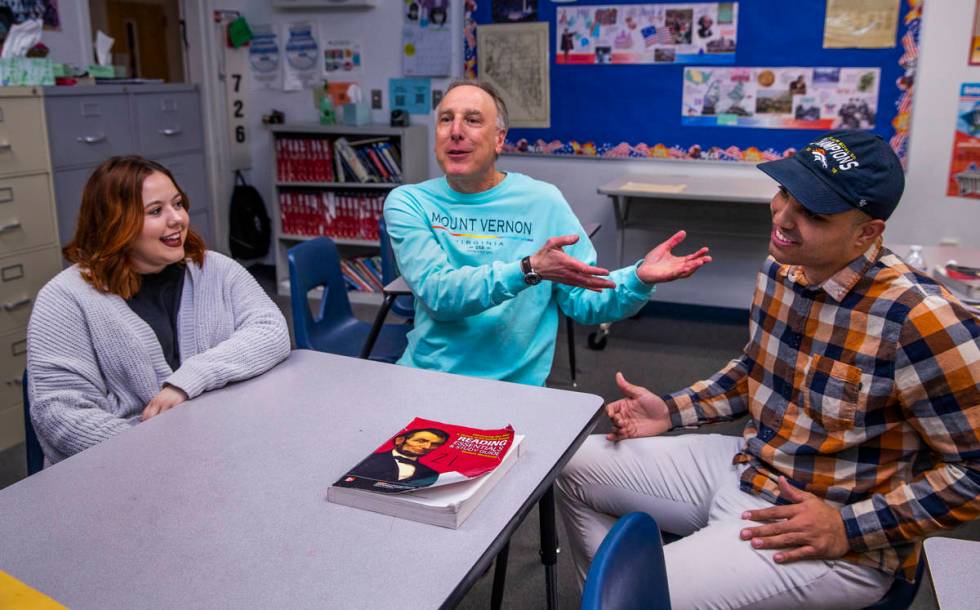Holocaust knowledge lacking among young Nevadans, survey shows

A new survey reveals that Nevada young adults’ knowledge of the Holocaust mostly mirrors that of other 18-to-39-year-olds across the country, and that’s not necessarily a good thing.
For example, the survey says more than half of Nevada respondents don’t know that 6 million Jews were murdered in the Holocaust, and 24 percent believe that the Holocaust happened but that the number of Jews killed in it has been “greatly exaggerated, is a myth and did not happen, or are unsure.”
Even more disturbing: 15 percent of Nevada respondents believed that “Jews caused the Holocaust.”
The Conference on Jewish Material Claims Against Germany, which commissioned the study, calls it the first 50-state survey of American millennials’ and Generation Z’s knowledge of the Holocaust.
State-by-state results, the organization said, “highlight a worrying lack of basic Holocaust knowledge, a growing problem as fewer and fewer Holocaust survivors — eyewitnesses to a state-sponsored genocide — are alive to share the lessons of the Holocaust.
“I think for those of us involved in Holocaust education, it’s a pretty sobering picture of the state of (Holocaust) knowledge among that age group,” said David G. Marwell, a historian and member of the survey task force.
U.S. Sen. Jacky Rosen, a Nevada Democrat, called the survey’s findings “shocking.”
“Failing to educate young Americans about the gravity and scope of the Holocaust does a disservice to the memory of its victims and to our duty to ensure that ‘Never Again’ means never again for anyone,” Rosen said in a statement.
The findings “demonstrate the importance and urgency of implementing the recently-enacted Never Again Education Act, bipartisan legislation I introduced to provide educators with the tools to teach our students the important lessons of the Holocaust,” Rosen said.
Surprising results
According to the survey, 63 percent of respondents nationally and 54 percent of respondents in Nevada didn’t know that 6 million Jews were killed during the Holocaust. However, with 46 percent who did, Nevada ranked fourth nationwide in a comparison of states in which respondents did know that fact.
A total of 24 percent in Nevada and 23 percent nationally believe that the Holocaust happened but the number of Jews who died in it has been “greatly exaggerated,” is a myth and did not happen, or they weren’t sure, the survey said.
In what the Claims Conference calls “one of the most disturbing revelations of the survey,” 11 percent of respondents nationally believe that “Jews caused the Holocaust.” In Nevada, the number was 15 percent.
Knowledge of Holocaust specifics also was lacking. The survey said 48 percent of respondents nationally and 43 percent in Nevada could not name any of the 40,000 concentration camps, death camps or ghettos in Europe during the Holocaust.
A total of 49 percent nationally and 56 percent in Nevada said they’ve seen Holocaust denial or distortion on social media or online, while, 56 percent nationally and a survey-topping 70 percent in Nevada say they’ve seen Nazi symbols in their communities or on social media platforms within the past five years.
But most respondents recognized the value of Holocaust education. According to the survey, 64 percent nationally and 62 percent in Nevada believe Holocaust education should be compulsory in school, and 80 percent nationally and 78 percent in Nevada said it’s important to continue teaching about the Holocaust, in part so that “it does not happen again.”
A renewed call for education
Mitchell Kalin, a seventh-grade history teacher at Justice Myron E. Leavitt Middle School, has been teaching the Holocaust for 17 years. The survey “makes me sad, but doesn’t surprise me,” he says.
“And we’re not even talking kids, we’re talking young adults. I think part of it is they didn’t get a proper foundation (in) education about the Holocaust when they were in school.”
Kalin says the survey underscores the importance of giving children a solid foundation.
The Holocaust can be “daunting” to teach, says Kalin, who uses a program by Echoes & Reflections. In 2019, he traveled to Israel with the organization to participate in a Holocaust instructional program.
Kalin says he’s certain that students he has taught over the years would answer the survey’s questions differently. And while its respondents are young adults, he said Holocaust education should begin early.
“I really think the earlier you hit kids with this, the more it sticks with them,” he says. “But also, as a teacher, you need to make sure we’re doing it correctly.”
Contact John Przybys at jprzybys@reviewjournal.com. Follow @JJPrzybys on Twitter.